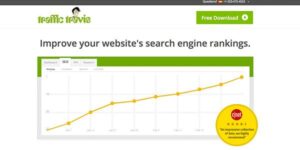http://josecabello.net/marketing/19-herramientas-que-te-ayudaran-a-espiar-a-tu-competencia/
traducido por Federico Dilla
23 tools to help you spy on your competitors
January 31, 2016 By Jose Cabellospy-competition
If you're really serious about your blog or your website, one thing you can not miss: spy on your competition.
When I say spy, I am not referring to that put them bugged or you want to sneak in the installations of the competition to steal confidential information.
Rather, what I mean to spy on your competition refers rather to "study your competition."
And who is your competition? Really easy.
The fastest way is to search on Google and target those who are the top five results.
For example, say you have a store of sneakers.
You could start looking for example in Google "running shoes".
Those first five results would be five potential competitors.
Therefore, once you have located roughly who your competitors, it's time to spy on or what is the same: full study them to see what they have done to get to be there.
To make a good spy, worthy of James Bond, here I bring you a complete list of the 19 best tools to spy on your competition:
1) Woorank
WooRank
WooRank is a tool that performs a full scan of your website.
Analyzed aspects related to SEO, social media, marketing, etc. and offers suggestions for better and you optimize your website.
Also use it to check your website, you can do is to analyze the websites of your competitors and get an idea of how they are.
2) SpyOnWeb
spyonweb
SpyOnWeb is a tool that gives you information on the backend of a website.
Aspects such as the IP address, ID Google Analytics, Alexa rankings, etc.
It can be used to find other websites that have the same owner (and spy on them as well).
3) Alexa
alexa
Alexa, a company that is part of Amazon, is an analytical tool that offers commercial traffic information from a website.
The Alexa ranking is known since many years to rank pages based on the (estimated) traffic of a website.
While you will not find exactly the traffic you have a website, if you used to extrapolate the information.
Ie if you're comparing different pages, you can determine which pages have more visits or less.
It also gives you other information such as bounce rate, demographic information, etc.
4) SimilarWeb
SimilarWeb
SimilarWeb is a freemium service that helps you analyze the traffic of a website.
When you put a URL to analyze, you get positioning data, estimated monthly traffic, average time on site, bounce rate, countries that visit the web, etc.
Furthermore, you also get information on traffic sources as you broken traffic into different sections, such as search engines, direct traffic, social networking, etc.
5) Compete
Compete
It is similar to Compete or Alexa SimilarWeb tool that parses a URL and gives information on traffic, etc.
Compete allows you to compare traffic between various websites.
With this tool we can determine our traffic and compare it to the competition.
Compete data is limited to US traffic, so its validity is limited to web analytics that country.
6) HubSpot Marketing Grader
HubSpot
This tool known company HubSpot, will help you learn at a quick glance as is the state of a web page.
Analyzes the SEO of a website, integration with social networks, if you blog and how it behaves, if you have a tool to generate leads and ultimately analyzes the performance of the web on mobile devices.
You can get a score and use it to compare your site with other competitors. As you details each stage of the analysis, it is quite interesting.
Best of all is that this tool is completely free.
7) Simply Measured
simply
Simply Measured specializes in analyzing everything related to social rede tool.
Using the tools (both free and paid), you can easily analyze the presence in social networks from your competition.
For example, you can analyze twitter followers, to analyze the contents of Facebook, etc.
The only downside is that the paid tools are somewhat expensive.
8) Planner keywords Google
keyword-planner
This tool is simply a classic.
You can not do any research that claims without going through here.
Initially, this tool was designed and created to help people who post ads on Adwords to determine which keywords are the most popular.
The tool shows you an average of searches over the past 12 months.
It is essential when it comes to making a good study of keywords as you can determine if those keywords that you had in mind have really searched or not.
It is also useful to analyze the keywords that your competitors use (these words can get by other tools).
9) With Built
BuiltWith
With Built With technology you can find out what is hidden behind a web page.
Whether a website uses WordPress or what plugins are operating in the web of your competitors will no longer be a problem.
From a quick glance, you'll get this technical information without much difficulty.
10) iSpionage
ispionage
iSpionage is another tool to find and analyze keywords and PPC campaigns competition.
I think this tool is more oriented ecommerce sites such as offers a pretty interesting information about PPC campaigns that are performing your competition, CPC estimated figures, keywords, competitors, etc.
So with a little research on your part, you will be able to draw interesting lists of keywords, lower your CPC spying on your competition and improve your ads in general.
The only drawback I see is that it is basically focused on the US market, UK and Canada.
11) SEMRush
SEMRush
This is my favourite. It's like the Keyword Tool from Google but VIP version.
SEMRush is a very powerful tool that offers a wealth of information about your competitors.
It's amazing what you can find out by analyzing a web page.
It gives an estimate of the number of monthly visits, you can get a list of keywords that lead visitors to a website, know what they wear on the results of Google, information about the backlinks you have, as well as data on their CPC campaigns (if made).
It has a free version with many limitations, but rather to help you when seeing the potential of this tool.
If you had to pay for a tool, I sincerely recommend you start with this.
12) Spyfu
SpyFu
Spyfu was among the first tools of espionage and analysis of websites that I discovered a few years ago.
Over time they have evolved considerably and today with SEMRush think are some of the best.
An interesting feature that has Spyfu is that you can see the evolution of the search engine rankings in a pretty good graphics.
In addition to the evolution over time, also they include the months or days where Google made a change in the algorithm so you can compare if these changes had an impact on the organic positioning of the web.
13) Google Alerts
alerts
Google Alerts is a tool not well known to the general public, which helps you monitor your keywords.
What does this mean?
Well, you can keep track of when you publish something on the Internet that includes the keywords that you're interested be controlled.
It can be your brand, your name, type of service, your competitors, etc.
The operation is very simple and once set, you will receive an email every time some internet content containing the keywords that you have selected appears.
A good idea is to monitor your competitors and so determine when and from where to get backlinks.
14) Screaming Frog
screaming-frog
Screaming Frog is a tool that what is internally analyze the contents of a website.
It is very similar to what the robot of Google when it comes to web and start to analyze the content.
After analyzing the web, it offers a list of the URLs, page titles, meta description, holders (H1, H2, etc.), links, etc.
With this tool you can analyze the level of optimization of the websites of your competitors.
You can also find new keywords with which to work.
15) Domain Tools: Whois
whois
The Whois is another classic in the arsenal of good spy.
This tool gives you information about the owner of a domain.
Although sometimes you can hide some information, usually you can obtain data about the hosting company they have contracted, DNS names, when the domain was registered IP address.
No information is neither confidential nor super important, but it is worth having it to look around a bit and find out more about your competitors.
16) Traffic Travis
traffic-travis
Traffic Travis is a tool that you must install on your computer and gives you information about the keywords you position your competition.
You can also perform a kind of check on the SEO of your competitors website, which can give you ideas about what you should improve your points.
Another Traffic Travis features it has is that you can track the position of your keywords.
17) WebCEO
WebCEO
WebCEO is a tool that will help you spy on your competitors and monitor their SEO strategies.
You will discover what keywords are positioned, analyze your backlinks, what movement have in social networks, their traffic, etc.
WebCEO performs detailed analysis of the websites and presents a fairly complete report.
You can even make reports to your customers, allowing you to customize them.
WebCEO really just a tool, a complete suite of tools to help monitor and study your competition thoroughly.
18) SEO Book
SEOBook
SEO Book is one of those tools that never go out of style.
While there are many tools and content that are paid in SEO Book it is also true that the amount of free stuff you can find on this site is amazing.
Among his free tools, you can find extensions to the browser as SEO Toolbar, Rank Checker, and then a bunch of independent tools that will help both to spy on your competition and analyzing your own site and to improve it.
19) Open Site Explorer
open-site-explorer
Open Site Explorer is one of the most popular tools Moz and focuses primarily on analyzing the backlinks of a specific website.
You can also extract information about domain authority, internal links, external, etc.
Any study of backlinks that price competition must have the information you will find here.
20) MozBar
mozbar
Another excellent tool that offers the people of Moz completely free.
MozBar is an extension that is available for both Firefox and Google Chrome (although in my experience, it works better than Google Chrome).
With this extension you will see in real time both the Domain Authority (DA) as the Page Authority (PA) of the pages you visit.
These two metrics, if they are not infallible either, can give you a pretty good idea about authority and positioning of a website.
21) SEOQuake
seoquake
SEOQuake is another browser extension, this time in the form of bar, which will provide interesting information.
The peculiarity of this tool is that it gives you the information directly on the Google results page.
That is, if you do a search on Google, you'll see the page with the first 10 sites and also positioned just below each bar SEOQuake see.
In this bar you will find information about Page Rank (something already somewhat obsolete), number of inbound and outbound links, position in the ranking of Alexa, etc.
22) Ahrefs
ahrefs
SEMRush Ahrefs is next to another of my favorite tools.
It is used almost exclusively to analyze the profile of links of a particular website.
You can find out which are the best backlinks you have your competition, where they come most backlinks, the anchor text used, etc.
You could say that Ahrefs're making it a complete picture profile links on the web.
It has a free trial option where the results are limited, but you can get an idea of what you can get if you upgrade to the paid version.
23) Monitor Backlinks
display
Backlinks Monitor is another tool that is similar to Ahrefs.
With this tool you can monitor both your backlinks as your competition.
It also lets you keep track of the positions of keywords. This way you'll know whether up or down positions.
It is not as powerful as Ahrefs, but instead pay plans are cheaper, so it may be a good choice to start testing these tools without having to invest too much money.
24) SEO Majestic
majestic-seo
This is one of the most recognized in the world of the SEO tools.
With Majestic SEO you can analyze the profile of links in a domain.
That is, you can determine which are the most important links that has a domain, different anchor text they use, if they follow or no-follow, etc.
As in most such tools, the free version is extremely sharp, but still able to get some information and determine whether you are worth moving to the paid version.
25) Buzzsumo
buzzsumo
With Buzzsumo you can analyze your competitors website but by focusing especially on social networks.
What does this mean?
Well you can find out what items or sections of a web are shared over social networks.
This is interesting because normally these items are most visitors come to the web, so you can use the information you get to get ideas for your own articles or contents.
If your audience is similar to a website that you analyze, you'll quickly learn what types of content are most like the followers.
26) Fan Page Karma
fanpage-karma
Fan Page Karma is a tool that lets you measure the extent of the social networks of your competitors (and yours too, of course).
Thus, you can analyze your engagement, types of posts they publish, the best times to publish, etc.
As Buzzsumo is useful to get ideas on what kind of content sharing to generate more movement on social networks.
27) Twitonomy
twitonomy
Twitonomy is an interesting analytical tool focused on twitter.
With it you can monitor mentions, retweets, favorites, etc.
You can find out who speaks or what your competitors are sharing with their followers.
And you can track the growth of followers of the account and make some statistics directly in Excel and PDF.
28) Feedly
feedly
Feedly is an RSS aggregator that lets you subscribe to all your blogs and pages of competition and thus be aware of when they publish new content.
While it is not a proper spy tool, it can be used to control how often your competition issues, they publish, etc.
29) Wayback Machine
WayBackMachine
Wayback Machine is a kind of internet time machine.
Thanks to this tool you will know how it was a web at a certain date.
For example, you can enter the URL of one of your competitors and select a date several years ago.
With this you can see what the design of your competition and also another interesting thing: analyze whether the domain in question had previously been used for other page.
Conclusions
With all the tools that I have presented to you, you can extract valuable information about your competition.
Often this information is neither sight nor to everyone, but in the background is there.
It is not top secret or confidential information, but in some cases this information can help you improve your own website, achieving better content, more visitors and ultimately more sales.
23 HERRAMIENTAS QUE TE AYUDARÁN A ESPIAR A TU COMPETENCIA

Si vas realmente en serio con tu blog o con tu página web, hay una cosa que no puedes dejar de hacer: espiar a tu competencia.
Cuando digo espiar, no me estoy refiriendo a que les pongas micrófonos ocultos o a que te quieras colar en las instalaciones de la competencia para robarles información confidencial.
Más bien, a lo que yo me refiero con espiar a tu competencia se refiere más bien a “estudiar a tu competencia”.
¿Y quién es tu competencia? Pues muy fácil.
Lo más rápido es realizar una búsqueda en Google y apuntar quienes son los primeros cinco resultados.
Por ejemplo, pongamos que tienes una tienda de zapatillas de deporte.
Podrías empezar buscando por ejemplo en Google “zapatillas para correr”.
Esos cinco primeros resultados serían cinco competidores potenciales.
Por lo tanto, una vez que tienes más o menos localizados quiénes son tus competidores, llega el momento de espiarles o lo que es lo mismo: estudiarles al máximo para saber qué han hecho para llegar a estar ahí.
Para poder hacer un buen espionaje, digno del mismísimo James Bond, aquí te traigo una completa lista con las 19 mejores herramientas para espiar a tu competencia:
1) Woorank

Woorank es una herramienta que realiza un completo análisis de tu página web.
Analiza aspectos relativos al SEO, las redes sociales, marketing, etc. y te ofrece sugerencias para que mejores y optimices tu web.
Además utilizarla para revisar tu web, lo que puedes hacer es analizar las webs de tus competidores y hacerte una idea de cómo están.
2) SpyOnWeb

SpyOnWeb es una herramienta que te proporciona información relativa al backend de una página web.
Aspectos como la dirección IP, ID de Google Analytics, Ranking de Alexa, etc.
Te puede servir para averiguar que otras páginas web tiene el mismo dueño (y espiarlas también).
3) Alexa

Alexa, que es una empresa que forma parte de Amazon, es una herramienta de analítica que te ofrece información comercial sobre el tráfico de una web.
El ranking Alexa es conocido desde hace muchos años por clasificar las páginas basándose en el tráfico (estimado) de una web.
Si bien no vas a averiguar exactamente el tráfico que tiene una página web, si que te sirve para extrapolar la información.
Es decir si vas comparando diferentes páginas, podrás determinar qué paginas tienen más visitas o menos.
También te ofrece otro tipo de información como el porcentaje de rebote, información demográfica,etc.
4) SimilarWeb

SimilarWeb es una servicio freemium que te ayuda a analizar el tráfico de una web.
Cuando pongas una URL para analizarla, obtendrás datos relativos al posicionamiento, tráfico estimado mensual, tiempo medio en la web, porcentaje de rebote, países que más visitan la web, etc.
Asimismo, también obtendrás información relativa a las fuentes de tráfico, ya que te desglosa el tráfico en diferentes secciones, como por ejemplo buscadores, tráfico directo, redes sociales, etc.
5) Compete

Compete es una herramienta similar a Alexa o Similarweb, que analiza una URL y te ofrece información relativa al tráfico, etc.
Compete permite comparar el tráfico entre varios sitios web.
Con esta herramienta podemos determinar cuál es nuestro tráfico y compararlo con el de la competencia.
Los datos de Compete se limitan al tráfico de Estados Unidos, por lo que su validez queda limitada al análisis web de ese país.
6) Hubspot Marketing Grader

Esta herramienta de la conocida empresa Hubspot, te ayudará a conocer de un rápido vistazo como se encuentra el estado de una página web.
Analiza el SEO de una web, la integración con las redes sociales, si tiene blog y cómo se comporta, si cuenta con alguna herramienta para la generación de leads y por último hace un análisis del desempeño de la web en dispositivos móviles.
Puedes obtener una puntuación y utilizarla para comparar tu página con la de otros competidores. Como te detalla cada punto del análisis, es bastante interesante.
Lo mejor de todo es que esta herramienta es completamente gratuita.
7) Simply Measured

Simply Measured es una herramienta especializada en analizar todo lo relativo a las rede sociales.
Gracias a sus herramientas (tanto gratuitas como de pago), podrás analizar fácilmente la presencia en las redes sociales de tu competencia.
Por ejemplo, puedes analizar los seguidores de twitter, realizar un análisis del contenidos de Facebook, etc.
La única pega es que las herramientas de pago son un tanto caras.
8 ) Planificador de palabras clave de Google

Esta herramienta es simplemente un clásico.
No puedes hacer ninguna investigación que se precie sin pasar antes por aquí.
Incialmente, esta herramienta se diseñó y creó para ayudar a la gente que publica anuncios en Adwords a determinar qué palabras clave son las más buscadas.
La herramienta te muestra una media de las búsquedas realizadas durante los últimos 12 meses.
Resulta indispensable a la hora de realizar un buen estudio de palabras clave ya que puedes determinar si esas palabras clave que tenías en mente tienen realmente búsquedas o no.
También es útil para analizar las palabras clave que utiliza tu competencia (estas palabras las puedes obtener mediante otras herramientas).
9) Built With

Con Built With podrás averiguar qué tecnología se esconde detrás de una página web.
Saber si una web utiliza WordPress o qué plugins son los que funcionan en la web de tus competidores ya no será un problema.
De un rápido vistazo, podrás obtener esta información técnica sin mucha dificultad.
10) iSpionage

iSpionage es otra herramienta para buscar y analizar palabras clave y campañas de PPC de la competencia.
Creo que esta herramienta está más orientada a webs tipo ecommerce, ya que te ofrece una información bastante interesante acerca de las campañas de PPC que está realizando tu competencia, cifras estimadas de CPC, palabras clave, competidores, etc.
Así que con un poco de investigación por tu parte, serás capaz de sacar listas de palabras clave interesantes, bajar tu CPC espiando a tus competidores y mejorar tus anuncios en general.
La única pega que le veo es que está básicamente centrada en el mercado de EEUU, UK y Canadá.
11) SEMRush

Esta es mi favorita. Es como la Herramienta para palabras clave de Google pero versión VIP.
SEMRush es una herramienta muy potente que te ofrece muchísima información acerca de tus competidores.
Es increíble todo lo que puedes averiguar analizando una página web.
Te da una estimación del número de visitas mensuales, puedes obtener un listado de las palabras clave que llevan visitas a una web, saber qué posiciones ocupan en los resultados de Google, obtener información acerca de los backlinks que tiene, así como datos relativos a sus campañas de CPC (si las hacen).
Tiene una versión gratuita con bastantes limitaciones, pero que te ayuda bastante a la hora de ver el potencial de esta herramienta.
Si tuvieras que pagar por alguna herramienta, yo sinceramente te recomiendo que empieces con esta.
12) Spyfu

Spyfu fue de las primeras herramientas de espionaje y análisis de webs que yo descubrí, hace ya unos cuantos años.
Con el paso del tiempo han evolucionado bastante y hoy en día creo que junto a SEMRush, son unos de los mejores.
Una funcionalidad interesante que tiene Spyfu es que puedes ver la evolución de los rankings en los buscadores en una gráfica bastante buena.
Además de la evolución en el tiempo, también incluyen los meses o días donde Google hizo algún cambio en el algoritmo para que puedas comparar si esos cambios tuvieron incidencia en el posicionamiento orgánico de la web.
13) Google Alerts

Google Alerts es una herramienta no muy conocida para el gran público, que te ayuda a monitorizar palabras clave.
¿Qué quiere decir esto?
Pues que puedes llevar un seguimiento de cuando se publica algo en internet que incluya las palabras clave que a ti te interesa tener controladas.
Puede ser tu marca, tu nombre, un tipo de servicio, tus competidores, etc.
El funcionamiento es muy sencillo y una vez configurado, recibirás un email cada vez que aparezca algún contenido en internet que contenga las palabras clave que tu has seleccionado.
Una buena idea es monitorizar a tus competidores y así averiguar cuando obtienen backlinks y desde dónde.
14) Screaming Frog

Screaming Frog es una herramienta que lo que hace es analizar internamente el contenido de una página web.
Es muy similar a lo que hace el robot de Google cuando llega a una web y empieza a analizar el contenido.
Una vez analizada la web, te ofrece un listado con las URLS, los títulos de las páginas, las meta description, los títulares (H1, H2, etc), enlaces, etc.
Con esta herramienta podrás analizar el nivel de optimización de las webs de tus competidores.
También podrás localizar nuevas palabras clave con las que trabajar.
15) Domain tools: WhoIs

El Whois es otro clásico dentro del arsenal del buen espía.
Esta herramienta te ofrece información acerca del dueño de un dominio.
Aunque en ocasiones se puede ocultar alguna información, normalmente podrás obtener los datos acerca de la empresa de hosting que tienen contratada, los nombres de DNS, cuándo se registró el dominio, dirección IP.
No se trata de información ni confidencial ni super importante, pero no está de más tenerla para curiosear un poco y averiguar más sobre tus competidores.
16) Traffic Travis

Traffic Travis es una herramienta que tienes que instalar en tu ordenador y que te proporciona información acerca de las palabras clave que posiciona tu competencia.
También puedes realizar una especie de chequeo relativo al SEO de la web de tus competidores, lo cual te puede dar ideas sobre qué puntos debes mejorar tu.
Otra de las funcionalidades que tiene Traffic Travis es que te permite realizar un seguimiento del posicionamiento de tus palabras clave.
17) WebCEO

WebCEO es una herramienta que te ayudará a espiar a tus competidores y a monitorizar sus estrategias de SEO.
Podrás descubrir qué palabras clave tienen posicionadas, analizar sus backlinks, qué movimiento tienen en las redes sociales, su tráfico, etc.
WebCEO realiza análisis en profundidad de las webs y te presenta un informe bastante completo.
Puedes incluso realizar informes para tus clientes, ya que te permite personalizarlos.
WebCEO en realidad más que una herramienta, es una completa suite de herramientas que te ayudarán de monitorizar y estudiar a tu competencia a fondo.
18) SEO Book

SEO Book es otra de esas herramientas que nunca pasan de moda.
Si bien hay muchas herramientas y contenidos que son de pago en SEO Book, también es cierto que la cantidad de material gratuito que puedes encontrar en esta web es alucinante.
Entre sus herramientas gratuitas, puedes encontrar extensiones para el navegador como SEO Toolbar, Rank Checker, y luego un buen montón de herramientas independientes que te ayudarán tanto para espiar a tu competencia como para analizar tu propia web y poder mejorarla.
19) Open Site Explorer

Open Site Explorer es una de las herramientas más conocidas de Moz y se centra básicamente en analizar los backlinks de una determinada página web.
También podrás extraer información sobre la autoridad del dominio, enlaces internos, externos, etc.
Cualquier estudio sobre backlinks de la competencia que se precie tiene que contar con la información que aquí podrás encontrar.
20) MozBar

Otra de las excelentes herramientas que nos ofrece la gente de Moz de forma completamente gratuita.
MozBar es una extensión que está disponible tanto para Firefox como para Google Chrome (aunque por mi experiencia, funciona mejor la de Google Chrome).
Con esta extensión podrás ver en tiempo real tanto el Domain Authority (DA) como el Page Authority (PA) de las páginas que visites.
Estas dos métricas, si bien no son infalibles, te pueden dar una idea bastante aproximada sobre la autoridad y el posicionamiento de una web.
21) SEOquake

SEOquake es otra extensión para el navegador, esta vez en forma de barra, que te proporcionará información interesante.
La peculiaridad de esta herramienta, es que te ofrece la información directamente en la página de resultados de Google.
Es decir, si tu realizas una búsqueda en Google, verás la página con las primeras 10 webs posicionadas y además, justo debajo de cada una verás la barra de SEOquake.
En esta barra encontrarás información sobre el Page Rank (algo ya un poco en desuso), número de enlaces entrantes y salientes, posición en el ranking de Alexa, etc.
22) Ahrefs

Ahrefs es junto a SEMRush, otra de mis herramientas favoritas.
Se utiliza casi exclusivamente para analizar el perfil de enlaces de una determinada página web.
Podrás averiguar cuales son los mejores backlinks que tiene tu competencia, de dónde vienen la mayoría de backlinks, los anchor text que se utilizan, etc.
Se podría decir que con Ahrefs estarás haciéndole una completa radiografía al perfil de enlaces de una web.
Tiene una opción de prueba gratuita donde los resultados están limitados, pero te puedes hacer una idea de todo lo que puedes obtener si te pasas a la versión de pago.
23) Monitor Backlinks

Monitor Backlinks es otra herramienta que es similar a Ahrefs.
Con esta herramienta podrás monitorizar tanto tus backlinks como los de tu competencia.
También te permite llevar un seguimiento de las posiciones de las palabras clave. De este modo podrás saber si suben o bajan posiciones.
No es tan potente como Ahrefs, pero en cambio los planes de pago son más económicos, por lo que puede ser una buena opción para empezar a probar este tipo de herramientas sin tener que invertir demasiado dinero.
24) Majestic SEO

Esta es otra de las herramientas más reconocidas dentro del mundillo del SEO.
Con Majestic SEO podrás analizar el perfil de enlaces de un dominio.
Es decir, podrás determinar cuales son los enlaces más importantes que tiene un dominio, los diferentes anchor text que utilizan, si son follow o no-follow, etc.
Como en la mayoría de este tipo de herramientas, la versión gratuita está bastante recortada, pero aún así podrás sacar algo de información y determinar si te vale la pena pasar a la versión de pago.
25) Buzzsumo

Con Buzzsumo podrás analizar la web de tu competencia pero centrándote sobre todo en las redes sociales.
¿Qué quiere decir esto?
Pues que podrás averiguar qué artículos o secciones de una web se comparten más en las redes sociales.
Esto es interesante ya que normalmente esos artículos son los que más visitas llevan a la web, por lo que puedes utilizar la información que obtengas para sacar ideas para tus propios artículos o contenidos.
Si tu audiencia es similar a la de una web que analices, podrás conocer rápidamente qué tipos de contenidos son los que más gustan a los seguidores.
26) Fan Page Karma

Fan Page Karma es una herramienta que te permitirá medir el alcance de las redes sociales de tus competidores (y las tuyas también, claro).
De este modo, podrás analizar el engagement, los tipos de posts que publican, las mejores horas para publicar, etc.
Al igual que Buzzsumo, es útil para sacar ideas sobre qué tipo de contenidos compartir para generar un mayor movimiento en las redes sociales.
27) Twitonomy

Twitonomy es una interesante herramienta de analítica enfocada en twitter.
Gracias a ella podrás monitorizar las menciones, , retweets, favoritos, etc.
Podrás averiguar quien habla de tus competidores o qué están compartiendo con sus seguidores.
Además, podrás hacer un seguimiento del crecimiento de seguidores de la cuenta y sacar algunas estadísticas directamente en Excel y PDF.
28) Feedly

Feedly es un agregador RSS con el que podrás suscribirte a todos los blogs y páginas de tu competencia y así estar al tanto de cuando publican nuevos contenidos.
Si bien no es una herramienta de espionaje propiamente dicha, se puede utilizar para controlar cada cuánto publica tu competencia, qué publican, etc.
29) Wayback Machine

Wayback Machine es una especie de máquina del tiempo de internet.
Gracias a esta herramienta podrás saber cómo era una web en una determinada fecha.
Por ejemplo, puedes introducir la URL de uno de tus competidores y seleccionar una fecha hace varios años atrás.
Con esto podrás ver cómo era el diseño de tu competencia y también para otra cosa interesante: analizar si ese dominio en cuestión antes había sido utilizado para otro tipo de página.
Conclusiones
Con todas las herramientas que te he presentado, podrás extraer valiosa información sobre tu competencia.
Muchas veces este tipo de información no está ni a la vista ni al alcance de cualquiera, pero en el fondo está ahí.
No se trata de información super secreta o confidencial, pero en algunos casos esta información te puede ayudar a mejorar tu propia página web, logrando mejores contenidos, más visitas y en última instancia, más ventas.